
Interview with Erich Bissoir, member of SS Division Hitlerjugend, Kaiserslautern, 1992.
[Above: Erich Bissoir.]
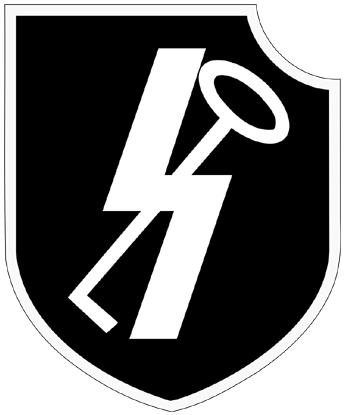
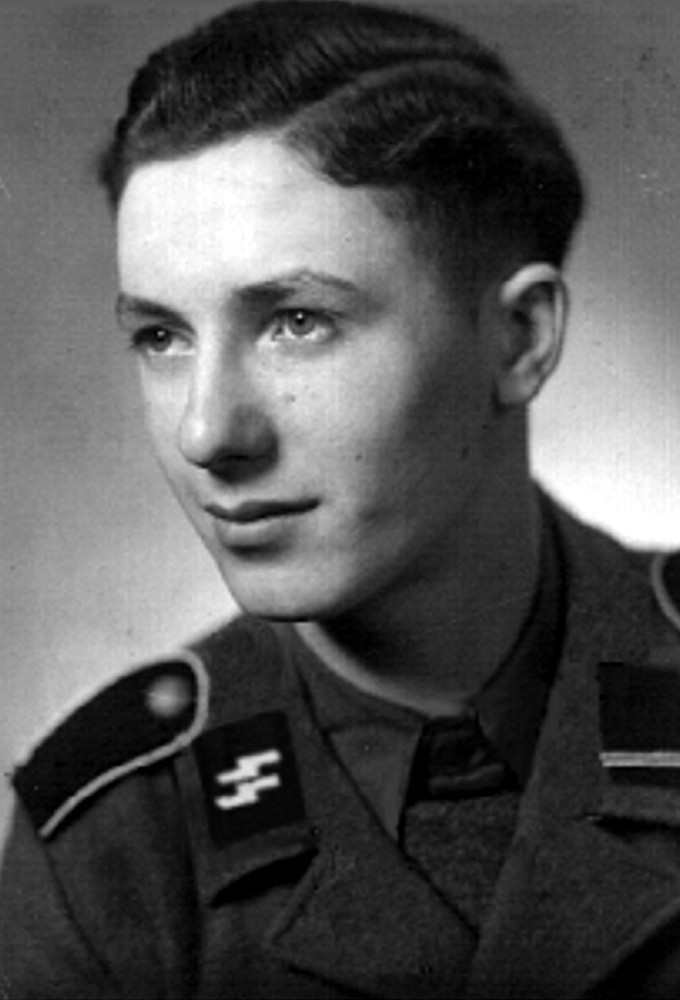

Interview with Erich Bissoir, member of SS Division Hitlerjugend, Kaiserslautern, 1992.
[Above: Erich Bissoir.]


Thanks for the chance to speak with you, as I mentioned on the phone I wanted to ask you a few questions. Can I start by asking why you chose the Waffen-SS as the branch to enlist in?
Erich: Yes, I was a member of the HJ in the motor unit and it was a given that we would join the military when we were old enough. The SS was the chosen branch as it was closely linked to the Führer and the Party. When war started I was 14, and I remember the English bombing Mannheim, I believe it was in the spring of 1940. This made an impression on me because it made me want to fight them.
That is what stands out the most, I remember reading about the first war, and how the English targeted civilians by imposing a blockade that was meant to starve women and children to end the war. Germany had to retaliate with U-boats and bombing to try to force them to quit. When I saw them bomb our cities and hit civilian areas, it made most Germans angry and want retaliation.
My HJ troop was used to clear rubble in one nasty raid in November and again in December 1940 on Mannheim. We had to be shielded from the bodies; adults did not want children seeing the dead. It was a curiosity however, and we could not help but to stare, I saw a woman lying halfway in a doorway; a bomb hit her place while she must have been fleeing. These things were on my mind when our leaders spoke of duty and sacrifice. I wanted to get back at those causing this.
In 1941 we had a few Waffen-SS combat veterans come and speak to us. They talked about how dire our fight was for the freedom of Europe, and how the hordes from the east and their plutocrat allies wanted to destroy our culture. It was easy for me to believe this, as the bombing of cities bothered me. I did not think it was right, I wish we did not do the same thing. It may sound strange, but I felt we were doing a disservice to our idea by bombing our fellow Europeans, as misguided as they may have been.
I do suppose the argument that we had no choice could be valid, as I do feel the Führer was forced into war, and then it spiraled out of his control. He built such a culturally superior state that aimed at preserving and growing Germanic culture and peoples. The war undid all of his work, and created enemies of this idea. I fervently believe that someday the lies about him and National Socialist Germany will fall.
I left these sit-down talks with the SS soldiers knowing I wanted to be one. I wanted to serve the Führer and Germany as an elite member of the Waffen-SS. In late 1942, we were assembled and told a new SS division was being formed and they wanted to know who might be interested in joining. They only wanted those over sixteen and I was sent home with a permission slip for my parents to fill out.
They were not happy about this, but also they understood Germany needed everyone to do their duty when the nation called. My mother was a member of a Party organization but she was opposed to young boys fighting, my father had many questions and went down to talk to our leader. After this, he agreed, saying we were just going to be used for rear area duties. It took a long time to hear back on this, it was in late 1943 when I was accepted into the Waffen-SS. We were told this new division would bear the name HitlerJugend.
I know you trained in France and Belgium, what was training like? How did the civilians view you and treat you?
Erich: We were mere boys, most were 17, and the people treated us like their own children. Much to the anger of our trainers, one woman, who owned a bakery, sent us cupcakes on arrival. Our trainers were all combat veterans from the elite Leibstandarte, the Führer's guard. They allowed us to have them, but I remember we had to share, as there were not enough. From then on, the fun was over. Our commander, Fritz Witt, gave a talk where he told us how serious the situation was, and how dire the consequences are on the battlefield if we forget our training. He said, "Survival is attention to details".
Our trainers also told us war stories and consequences of not paying attention to the small things. The first few weeks of training were more bonding, learning military drills, and fitness. We were proud to be led by men who wore the Iron Cross, German Cross, and Knight's Cross. We felt they were teaching us the very practical things to make us victorious. We marched in the countryside, and drilled on farm fields and woods. Sometimes we saw Wehrmacht units nearby, and we could hear them cast remarks as to how young we looked. In our minds, we wanted to show how tough we could be.
The people stayed to themselves mostly, a few would come and watch us march past, they would offer water, but we could not stop to accept. Once our leader let us stop to enjoy water on a very hot September day. We would have free time after our basic training was over, we could enjoy the sites or take a train back to Germany for the weekends. By late 1943 the bombings were getting bad, even France and Belgium were not spared. We would see the trails left by the formations as they flew.
In the time I was in France I never saw the people act anything else but nice to us. When we went out on the town to take walks and just enjoy nature, it was not uncommon for the girls to follow. Some of the old hares would tease if we had had our first kiss yet. I met a girl who was my age, and whose family made special butter for the fancy restaurants in Paris. They would let me take some back to camp to share. Even in the heart of the fighting in Normandy there was good relationships with the people. We helped many flee from the battle area. We also had orders to never bother them or harass them.
Now not all French liked us, I remember there was a woman who lived just outside Caen; she had lost her husband in the first war, and son in 1940. He was an officer I was told. No one was permitted to approach her, or try to buy from her. When she would be out in the yard, if we drove by she waved her hand at us as if saying we annoyed her and would yell at us. There were a few like this in Normandy, we left them alone and they did not bother us. We would also run across those who refused to sell to us, one comrade was reprimanded for stealing from one of these angry people, and he had to pay him triple the cost and apologize. He spoke French so it made it a little easy on him, to his amazement the man returned the extra money to him.
Our training was tough, and designed to keep us alive. For the most part the relations with the civilians were very good, we had very little issues. Many comrades met good friends and a few created lasting friendships that still flourish today in spite of the papers always reporting some type of crime we supposedly committed. My HQ regiment was billeted in homes with French families; we paid them for food, and would share our rations as well. We ate very good and even received good wine lessons. Life was good for us until the invasion.
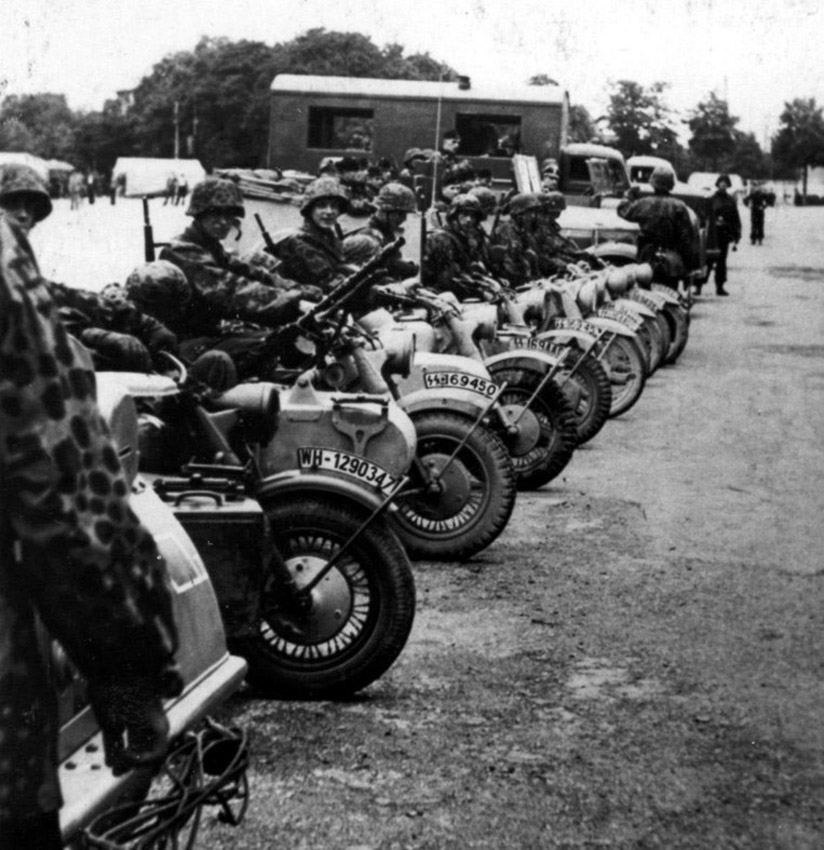
[Above: The brave knights of the SS Division Hitlerjugend.]
Erich: Busy, yet relaxed. I was posted to the motorcycle unit of the division; this entailed being a messenger and a scout. My training was complete in April of 1944, and I was used to take orders to the various commanders. I knew Witt, Meyer, Krass, and Kraemer well. Kurt Meyer was my favorite, as he took an interest in the well-being of his boys to the point of knowing our names and particulars. Our training continued right up to the invasion. It was in May 1944 that we were moved into the Caen area and did drills as a division. One drill was we had to race to the beach in Luc Sur Meer, grab orders and race back to Caen. I won this race, and received a piece of French cheese. These little things were done constantly; there was no complacency in the division. Our leaders had us doing some type of training most of the time, or at the least weapons cleaning. I saw more and more air activity, which made many of us think something was in the air. Then the bombings started along the coast, which was not mere nuisance raids. We were trained on dealing with saboteurs, the Allies parachuted many in to blow bridges and place mines.
The night the action happened was on June 5, which is when the paratroopers landed. Alarms went off very early in the morning and we went on alert. We could hear distant flak and gunfire. I was summoned to our command post at the Abby to receive orders. I remember Witt being very angry, as the OKW had ordered us held up until more information could be gleaned. He and his staff were very furious. I remember Ribbentrop had wanted to put in calls to top-level people to get us moving. By now it was evident an invasion was happening.
It was very confusing during these first hours; reports came in that parachutes were dropping nearby and I had to move out to give orders to send out some platoons to go investigate. We were allowed to do that by the OKW. By the early morning all hell broke loose. Planes were everywhere, and we could hear artillery fire all along the coast. Here I had my first run-in with Jabos [German slang for an Allied fighter-bomber-ed] . I was moving forward to scout and I was attacked by a fighter-bomber. I was lucky to avoid a bullet.
He got my tire so I had to stop and make repairs in the woods. I could see smoke and aircraft everywhere. I fixed my tire with a new inner tube and patch, which we carried in side containers. I put branches on my bike thinking that would help me. I went on my way close to the coast. I made it close but Wehrmacht soldiers, who could hardy speak German motioned that the enemy was near. I turned around and went back to report to our commander Fritz Witt. He was furious, and I remember he sighed, "So the old generals cost us the battle on the first day, one would think they work for the Allies".
After this, orders were sent out to prepare defenses as they broke through and stopped the 21st Panzer Division. The Jabos wrecked our supplies all within the first week. I remember seeing truck upon truck burnt out. Behind our lines the enemy used the resistance to halt rail lines, cut power, and mine roads. I know when caught these people were turned over to the Franc Garde who quickly shot them. The HJ was now preparing to fight in the countryside instead of the beaches. We felt excited to finally prove our mettle.
I know you fought both the British and Canadians, with the Canadians claiming the HJ killed surrendered prisoners, did you see or hear anything about this?
Erich: I really do not like discussing these things but I am assured you understand. To me it is possible that our men shot down prisoners, but I have my reservations. I will tell you what I know. Some comrades reported to Meyer that they witnessed surrendered Germans being shot by men who appeared to be Canadian. It was said they have no reason to shoot our men, and more information was needed, but I heard him say if they did this, they will pay.
The next day, if I remember right, comrades from a sister unit found some type of document on an officer, which stated no prisoners were to be taken, that was the rumor. During this time, we broke an attack and captured several Canadians who were marched under guard to our HQ. I remember they seemed very disrespectful, as many of their guards were mere youngsters of 17. I never saw them again so this may be the group. After this happened, a couple days later our commander assembled us and said that the enemy is to be treated fairly, and that even if they commit crimes we cannot stoop to their level.
Rumors went out that a couple of comrades shot them, but a friend also told me this was not true, he said he saw the whole thing and they were marched to a collection point with other prisoners. The Allies accused us of shooting them, and others during the war. I never saw this personally. I do know after the Ardennes Offensive many US units did shoot captured Waffen-SS soldiers, and brag about it to this day.
War crimes were not something we would have prided ourselves on; we fought for Germany and our honor. Killing surrendered soldiers, unless they did something terrible to cause it, was not permissible nor did it happen as far as I am concerned. I am only speaking the truth; I saw no evidence of German crimes. I did see French civilians who perished under the guns of the Allies; I still see the bodies in my nightmares. When we came across them, we could not give them a proper burial, we could only move them to where they would be easily seen. The Jabos strafed everything they could see.
I was visiting the hospital in Caen to convey that our commander was sorry but we could not spare any supplies to them. As I was leaving, the police started yelling and makeshift sirens went off, they were telling everyone to seek shelter. A Todt construction truck picked up dozens while driving to get out of the city, the driver yelled bombers are coming. I picked up a man who seemed lost and drove him out just as we heard the drone of the bombers. He was very thankful, and told me he had lost his parents already due to this recklessness. Caen was bombed many times, killing many innocents.
My regiment had very hard battles with the enemy and we succeeded in stopping their attacks several times, for the vast majority of the battles everyone acted fairly. We treated their wounded, and they treated ours. There were, no doubt, some hot heads on both sides that blurred the rules of war, I just never saw this personally. The worst I saw was in the Ardennes when a young comrade punched an American who was taking a very long time to unbuckle a holster. Our NCO dismissed him from the detail to cool down.
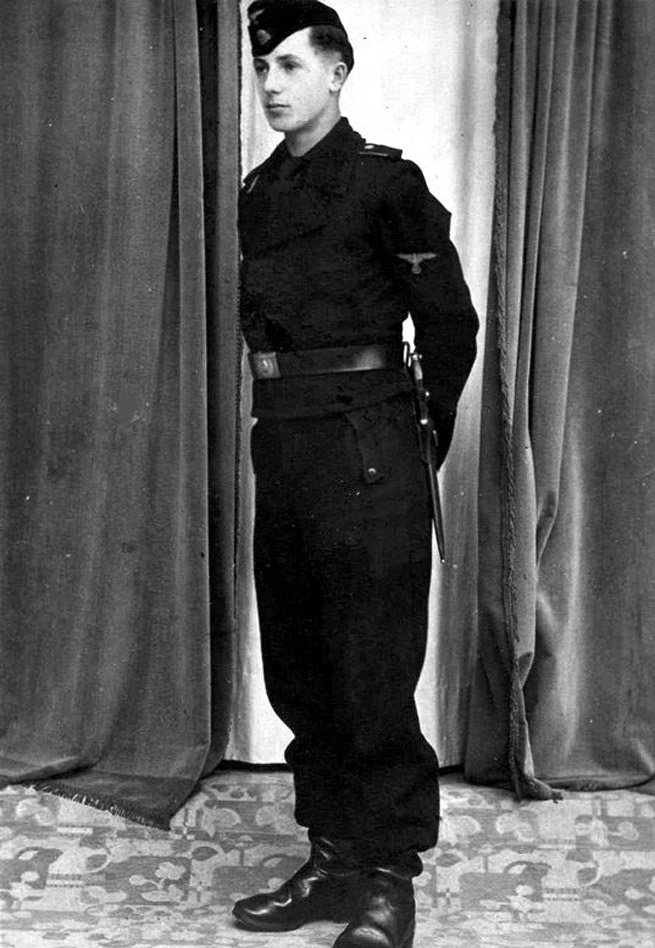
[Above: Erich Bissoir.]
Erich: As you know we were beaten by August, the Allies were flanking German armies and we received the order to fall back. Land we held for the whole duration, which we rarely gave up, was now being forfeited. The weather was clear, so we had trouble with Jabos, but many of our vehicles retreated at night. Some of the French helped guide us out, which I am sure some were just glad to see us go. Others left with us surprisingly; we tried to force them to not stay by us so they were not strafed. I left with Meyer in a convoy as part of the HQ battalion, he had to be forced to leave by Sepp Dietrich, retreating was not in our creed. Many of us cried, as it seemed so pointless now, many comrades died for the land we were now leaving. The Allies hit us with everything they could, long range guns, tanks, and rockets from the Jabos. We received replacements, and they were in complete confusion so they had to be managed, and we had prisoners that had to retreat with us.
Once we broke out of the Falaise area, we used small groups to protect the rear. The going was slow, as many bridges had been blown and had to be rebuilt, our pioneers were very busy. By September, we were back in the Reich; we had lost 80% of our material and strength. We spent the fall of 1944 rebuilding and healing. Overall, the so-called 'baby' division did very well and many decorations were won. By December, we rebuilt with fresh faces and were sent into action against the Americans in the Ardennes.
Do you think Germany could have won the Normandy battle?
Erich: Simply put we needed the air. Without air superiority, ground operations are doomed. My personal thoughts are that we were doomed from the start. Rommel was a good desert general, but he was tasked with defending a huge coastline, not knowing where the attack would come. It is said he knew it would be Normandy, so why did he not build the best defenses here? I went down to the beaches often, and there were small barriers, mines, and positions. These were woefully inadequate to stop a company, let alone an army.
The Allies tell their story as if they were the outnumbered underdogs, attacking a huge, well-supplied army of supermen behind a great fortress. This is simply not true. How would the papers feel knowing only a few companies opposed the landings, probably no more than 1,000 men? Many of these were eastern troops, whose minds were on fighting communists, not the west. These units had largely French weapons. The batteries were spaced very far apart, and rendered useless very fast. I saw a film from our sector showing Tommy just landing on the beach like on holiday, very little opposition.
The Americans had it slightly harder as one good defensive nest gave them quite a bruising. Other than that, it was them who did most of the shooting during those early critical hours. As I mentioned, Fritz Witt was furious we could not be moved to the beaches to hit them head on. We had no Luftwaffe to warn us of anything, flights should have been done night and day, but fuel was scarce.
For me the only way we could have won was to attack the landings the very moment they started. No quarrels and fights between Rommel and Rundstedt and instead the release of the tanks on the first day of the invasion. The weather was wet and stormy so it was on our side and we could have exploited it. We soldiers fought very well, against incredible odds, and held them at bay for nearly three months. If we would have had better generals, I believe we would have won. They criticize the Führer in their memoirs, they lived and he cannot defend himself against their accusations.
They claim he held up the Panzers, he made bad decisions, and he lost the war. He made great decisions early on that brought incredible victories, but later on maybe his judgment was not the best. Who knows? It seems to me that common sense should put the blame on the front line generals who were at the front, with the best intelligence.
How were you treated after the war?
Erich: We formally surrendered, and by then I was a seasoned soldier, having fought in the west and the east. We heard all the rumors about Soviet crimes and also that the Americans treated SS men badly. Our leaders told us the Allies will wake up and see the Soviets are the true enemy, and that we should stay together so we can join them to fight. Most of us believed the war would continue against Stalin. We entered an area controlled by the Americans; they pulled off our medals and decorations and stole things from us. We were not happy about this but could do nothing.
Overall, we were treated fair; they still held us as prisoners after the formal surrender. Officers told us to say we were forced to join and fight, and then we could go home. We all wanted to go home; we yearned for a warm meal and bed. Most of us just nodded so it would be over, we were too worn out to continue this fight. Some comrades later reported they were beaten, and sent to the French who tortured them. A few went to the Rhein camps and told terrible stories about the amount of men who died from disease and hunger that summer. Luckily, my fate was different; I was in a camp that wasn’t too bad.
The guards looked at us as misguided lads who were caught up in the times. They had this belief that the Hitler Youth was forced to join and fight or go to a camp. This helped our image I must say, and kept bad treatment away for most. I was paroled in 1946 and sent home.
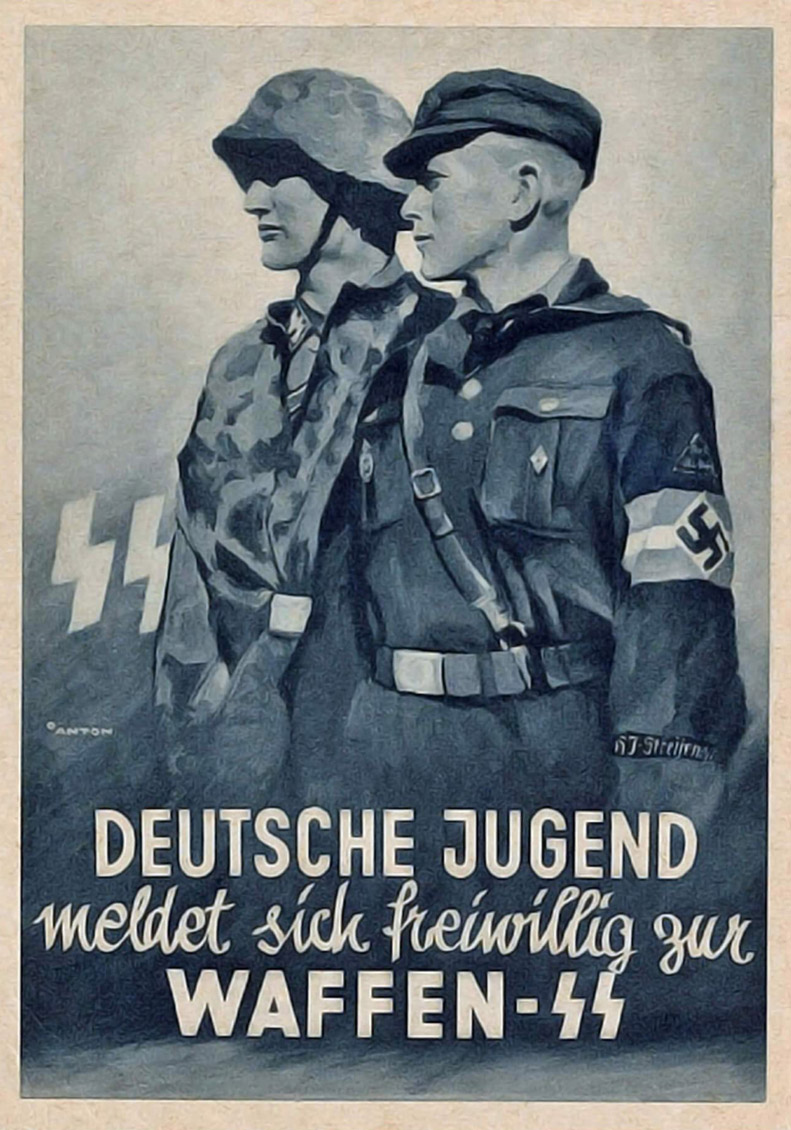
[Above: An SS Division Hitlerjugend poster: 'Deutsche Jugend meldet sich freiwillig zur Waffen-SS' (German Youth volunteer for the Waffen-SS).]